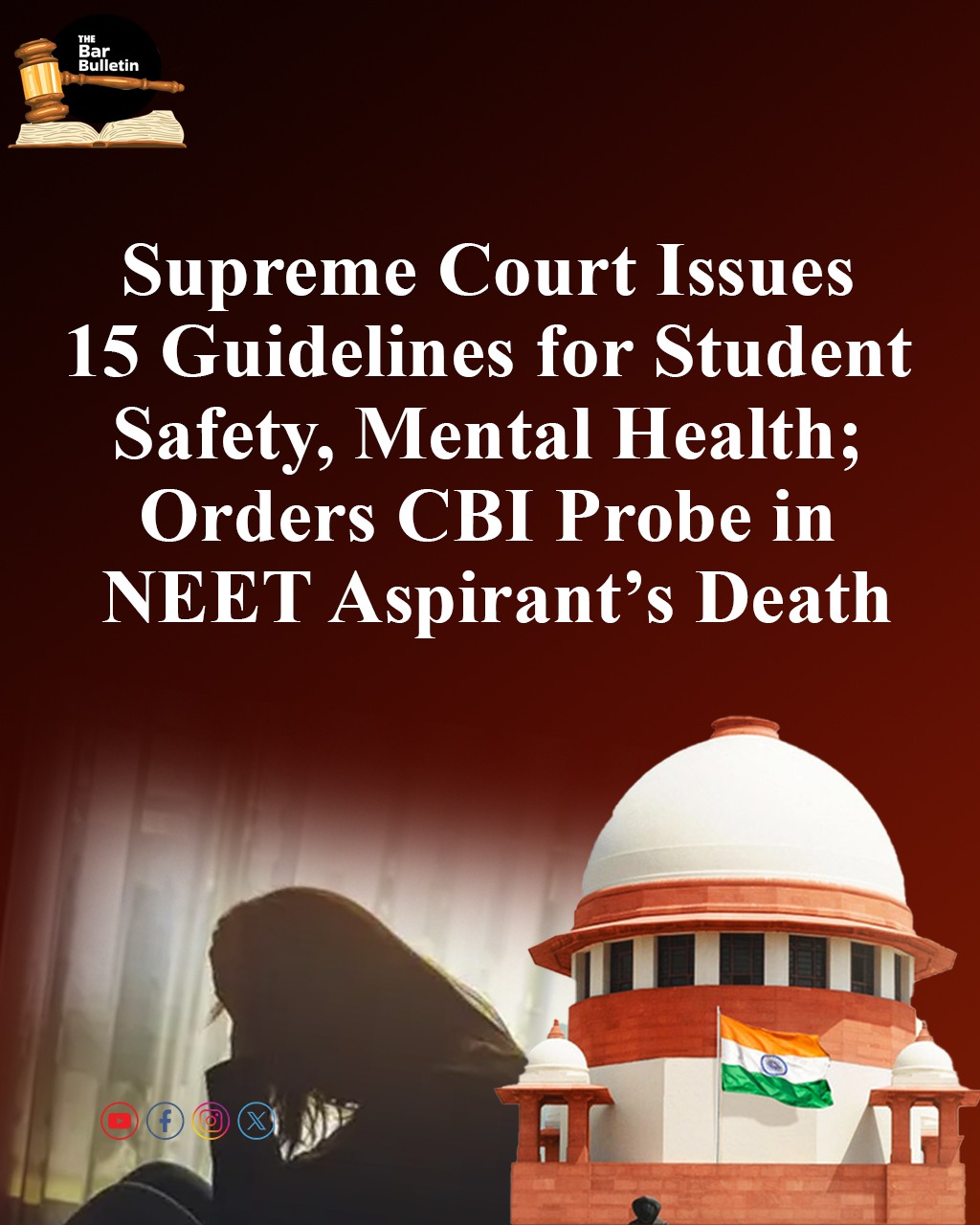The Supreme Court ordered a Central Bureau of Investigation (CBI) probe into the death of a 17-year-old NEET aspirant who died under suspicious circumstances in Visakhapatnam, Andhra Pradesh. The student, enrolled at Aakash Byju’s coaching centre, allegedly fell from the terrace of her hostel on July 14, 2023. Her father approached the Court alleging institutional negligence, manipulation of the inquiry process, and police inaction. The Court found glaring irregularities in the investigation conducted by the Andhra Pradesh Police, including unexplained contradictions in CCTV footage, the absence of critical medical and chemical analysis reports, and questionable handling of forensic evidence. The Bench also noted that the student, although conscious upon hospital admission, was placed on a ventilator without the family’s consent, and that the post-mortem and related inquiries were conducted by a single doctor with conflicting roles.
Setting aside the Andhra Pradesh High Court’s refusal to transfer the probe, the Supreme Court held that the case involved exceptional circumstances that warranted a fair, independent investigation by the CBI. The Court directed the CBI to complete the investigation and submit a status report within four months. The Court also treated the case as emblematic of a deeper crisis in student welfare, observing a “suicide epidemic” among Indian students. Citing NCRB data, it highlighted that over 13,000 student suicides were recorded in 2022, with rising cases in education hubs like Kota, Hyderabad, and Delhi NCR. The Court underlined that the mental health burden on students in high-pressure academic environments remained grossly unaddressed.
In exercise of its constitutional powers under Articles 32 and 141, the Court laid down a set of interim guidelines to be followed by all schools, colleges, universities, and coaching centres across India. These include
All educational institutions must appoint or empanel trained mental health professionals or counsellors to provide psychological support and first-line mental health care to students.
Institutions must establish a dedicated counselling room and create clear protocols for periodic and on-demand counselling of students.
Segregating students into academic batches or groups based on performance levels (e.g., “Topper” or “Repeater” batches) is prohibited, as it fosters anxiety, stigma, and discrimination.
All institutions must prominently display suicide prevention helpline numbers and mental health support contacts in classrooms, hostels, washrooms, and common areas.
Institutions must organise regular sensitisation sessions for parents, teachers, and non-teaching staff to identify early signs of stress or suicidal ideation among students.
Publicly shaming or singling out students for poor performance or behavioural issues is strictly prohibited.
- All educational institutions must establish internal grievance redressal committees with representation from students and independent members to hear and resolve complaints, especially concerning mental health or harassment.
- Institutions must conduct annual mental health and well-being audits, preferably through an external or third-party expert body.
- All instances of suicide or suicide attempts must be reported to the relevant district authority and an internal inquiry must be initiated. Preventive measures must be documented and implemented.
- All States and Union Territories must notify rules for registration, regulation, and monitoring of private coaching centres within two months, with emphasis on student safety, transparency, and mental health.
- Every district must constitute a Monitoring Committee, chaired by the District Magistrate, to oversee implementation of these guidelines and respond to complaints.
- Faculty and hostel staff must be trained in basic psychological first aid, to respond to students in emotional distress until professional help is available.
- Special safeguards must be implemented in high-pressure academic hubs like Kota, Sikar, Hyderabad, Bengaluru, and Delhi NCR, including regulatory inspections, helplines, and local mental health task forces.
- Institutions must adopt measures to address gender sensitivity, caste-based discrimination, and inclusivity, ensuring that marginalised students are not alienated or subjected to prejudice.
- The Union Government has been directed to file a compliance affidavit within 90 days, detailing the steps taken to implement these guidelines and monitor their enforcement across the country.
The Court also directed all States and Union Territories to notify rules for registration and regulation of private coaching centres within two months. District Magistrates have been tasked with setting up oversight committees to monitor implementation. The Union Government has been asked to file a compliance affidavit within 90 days.
Appearances:
Petitioner: Mr. Siddharth Dave, Senior Advocate, Ms. Nikita Sharma, Advocate, Mr. Prakhar Srivastava, Advocate, Ms. Anjali Agarwal, Advocate, Mr. B. Krishna Prasad, Advocate, Mr. Sarvajeet Yadav, Advocate, Ms. Sneha Bharti, Advocate
Respondent: Mr. K.M. Nataraj, Additional Solicitor General; Mr. P. Venkat Reddy, Standing Counsel for the State of Andhra Pradesh; Mr. Prashant Kumar, Advocate; Mr. Guntur Prabhakar, Advocate; Mr. V. Mahendra Reddy, Advocate; Mr. N. Samarpana Kumar, Advocate; Mr. G. Sivaraj, Advocate



